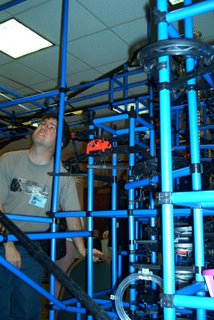
Off to Canada!
News from nowhere
 For years -- decades -- I've contemplated construction of a model railroad. Now, at last, with right of way and financing arranged, construction has begun on the Plainville Branch of the Ozark Lines Railway.
For years -- decades -- I've contemplated construction of a model railroad. Now, at last, with right of way and financing arranged, construction has begun on the Plainville Branch of the Ozark Lines Railway.
 From Penguicon: Proof that geeks do, in fact, have more fun. Especially when playing with the Chaos Machine, a collection giant-sized structural pieces with tracks and chutes for marbles. Plus gates, switches, conveyors, bells that go *ding*, and all kinds of twiddly bits.
From Penguicon: Proof that geeks do, in fact, have more fun. Especially when playing with the Chaos Machine, a collection giant-sized structural pieces with tracks and chutes for marbles. Plus gates, switches, conveyors, bells that go *ding*, and all kinds of twiddly bits. 




 Sadly, the vessel to which I referred in an earlier post seems not to be as seaworthy as it first seemed.
Sadly, the vessel to which I referred in an earlier post seems not to be as seaworthy as it first seemed.
It's like being a hamster rolling around in an exercise ball in the living room ... except the hamster is you, the exercise ball is a 12-foot diameter bubble, and the living room is a more than 650 foot decline down Mt. Brighton Ski Area.Wheeee!
6) Manages deceased patron support;...Fortunately, the rest of the ad clarifies what "deceased patron support" means:
...communicates respectfully with campus departments and/or relatives to retrieve library materials currently charged.I was worried for a moment there.
 It's not quite the pristine, sky-mirroring Lake View that real estate buyers and sellers in these parts yearn for. But I have become just a little bit fond of the swampy little millpond outside my humble little pied-a-terre. Swans, mallard ducks, Canada geese, and redwinged blackbirds seem to enjoy the pond and its brushy surroundings. I've seen rabbits galore, plus some aquatic mammal that might be either a small beaver or a large water rat. An acquaintance who lived in the same apartment complex in the past claims to have seen a red fox. I can't personally verify the vulpine, but it wouldn't surprise me.
It's not quite the pristine, sky-mirroring Lake View that real estate buyers and sellers in these parts yearn for. But I have become just a little bit fond of the swampy little millpond outside my humble little pied-a-terre. Swans, mallard ducks, Canada geese, and redwinged blackbirds seem to enjoy the pond and its brushy surroundings. I've seen rabbits galore, plus some aquatic mammal that might be either a small beaver or a large water rat. An acquaintance who lived in the same apartment complex in the past claims to have seen a red fox. I can't personally verify the vulpine, but it wouldn't surprise me.  Meanwhile, I've been occupying myself with small scale vegetative projects, as seen here. Spearmint, chives, rosemary, catnip. Plus dill, because I liked the looks of its feather fronds even though I haven't the foggiest idea how to use it, and coriander because I liked the smell. We'll see how long they manage to survive.
Meanwhile, I've been occupying myself with small scale vegetative projects, as seen here. Spearmint, chives, rosemary, catnip. Plus dill, because I liked the looks of its feather fronds even though I haven't the foggiest idea how to use it, and coriander because I liked the smell. We'll see how long they manage to survive. If anyone has any wonderful and foolproof recipes using these herbs, let me know!
If anyone has any wonderful and foolproof recipes using these herbs, let me know!
Without waving a flag about it, Parker makes his intention clear in classic he-man style: having achieved the ideal stage of maturity, his courtly knight will not age, wither or forsake his heroic mission. And that's not all. Hawk will always be scary. Susan will always be a beauty. And there will always be a dog named Pearl in the house.Part of the appeal of the books is in the protagonist's deadpan, smart-aleck attitude. It's no exaggeration to say that I read these books more for the rapid-fire dialogue and sardonic internal comments as for the plot.
"Do you do divorce work?" the woman said.What guy with lingering adolescent delusions of lonely intellectual superiority could possibly resist identifying with this narrator?
"I do," I said.
"Are you any good?"
"I am", I said.
"I don't want likelihood," she said. "Or guesswork. I need evidence that will stand up in court."
"That's not up to me," I said. "That's up to the evidence."
She sat quietly in my client chair and thought about that.
"You're telling me you won't manufacture it," she said.
"Yes," I said.
"You won't have to," she said. "The sonovabitch can't keep his dick in his pants for a full day."
"Must make dining out a little awkward," I said.
She ignored me. I was used to it. Mostly I amused myself....
Coulter, whose books include the bestseller "How to talk to a Liberal (If You Must)," argues in the new book the women she dubs "the Witches of East Brunswick" wanted to blame President George W. Bush for not preventing the attacks.And no, she's not sorry. Evidently she rather enjoys the attention.
"These broads are millionaires, lionized on TV and in articles about them, reveling in their status as celebrities and stalked by the grief-arazzis," she wrote. "I've never seen people enjoying their husbands' deaths so much."
"By the way, how do we know their husbands weren't planning to divorce these harpies? Now that their shelf life is dwindling, they'd better hurry up and appear in Playboy."
There are readers, there are writers, there are printing presses. And there are thousands of weird characters living off the readers the writers, and the printers. Nobody knows why.None too surprisingly, LLLofNY was published by Vantage Press, one of the best known of the subsidy or "vanity press" companies. In the past, I've taken their imprint as a cautionary sign, a warning that what lay between the covers was most likely of interest only to the author's relatives and, perhaps, denizens of his home town. In most cases, I suspect that this is still true, but Woodford's cranky-but-charismatic book does have its appeal. In some ways, his disdain for the middlemen of the publishing industry seems similar to Ayn Rand's scorn for "second-handers".
There are the publishers who turn up five thousand geniuses a year and swear on their book jackets that these will be immortal.
There are the editors who tell the publishers and the public what they ought to publish and what they ought to read -- and the authors what they ought to write.
There are the critics, a portion of whom say this about a book and a portion of whom say that -- none of it important to anybody -- according to how much money a given publisher is yearly accustomed to paying for advertising.
Now the weird parasites have come to an impasse. They have hired so many mental giants to buoy things up for readers and writers that they cannot any longer afford to pay the printers without putting the prices of books so high nobody will buy them.
They can't get rid of the printers and they won't get rid of their expensive masterminds, so they want to take most of the author's royalties away from him on the theory that the author is the only real non-essential in the publishing business. But that isn't the solution. If writers' royalties are lowered they'll quit writing. Most of them don't make a living as it is.
So what is the answer to all this?
Very simple. Bring the reader, the writers and the printer together and eliminate all the weird characters.
The way to do this is obvious and a resounding start has already been made. Self-publication....
As a matter of fact what the public really wants is comic books full of sadism, masochism, rape and arson, and everything but comedy. The sale of these things makes us all look silly -- all book authors, publishers and editors. The public embraced these abortions because present day publishers bored hell out of them.He goes on to demonstrate that certain ongoing debates in library selection policy -- "give 'em what they want" versus "give them what they need" -- are nothing new.
The publishing confraternity comeback to this would be that they are trying to levitate the public to "better things". Sure. But "better" according to whose viewpoint...From elsewhere in the same chapter:
Fantastically enough it is impossible for the average publisher to envision himself as a gadget attached to a printing press rather than a schoolmarm. When the publisher steps out of his legitimate function as a packager and forwarder, he cures people by the millions of the habit of reading books, just as real schoolmarms make windrows of brats permanently allergic to literature by cracking them over the head with the dullest of it.An entertaining read.